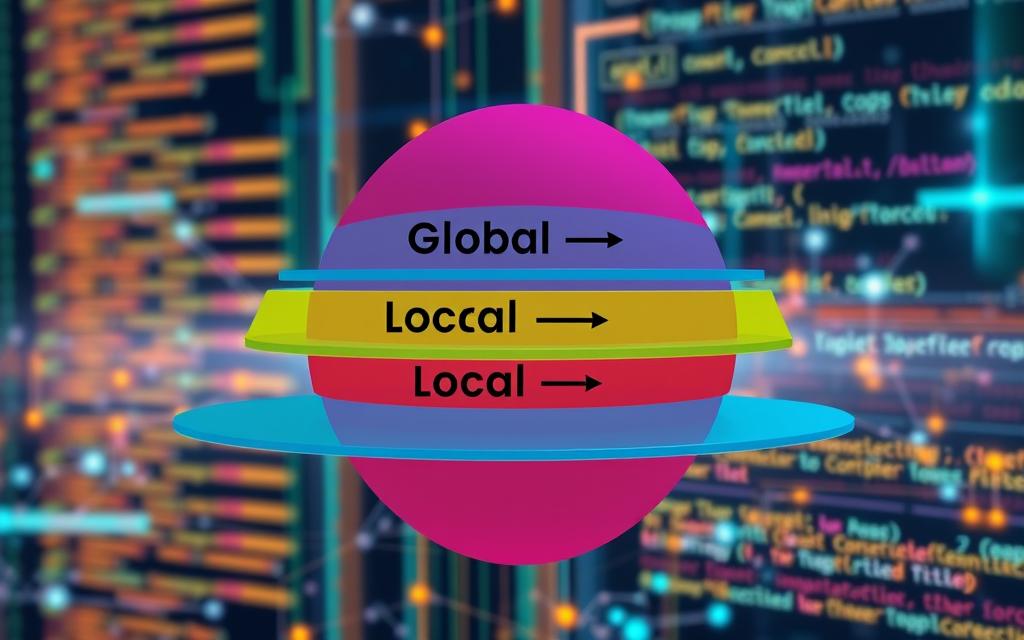Understanding Scope in Computer Science: Definitions and Examples
In computer science, the idea of scope is about the part of a program where certain names, like variables or functions, stay usable. This key idea helps us understand how programs avoid mix-ups when multiple parts use the same name. Grasping the concept of scope in computer science is crucial. It helps in knowing how name binding works across different programming styles, including lexical scope and dynamic scope.
Lexical scope, or static scope, is based on the code’s written layout. On the other hand, dynamic scope depends on the program’s running conditions. Most current programming languages use lexical scope for organizing variables. This method helps in creating code where its parts are well-defined. By making clear limits for variable access, it helps to stop unexpected changes across a program. This ensures the code is easy to manage and well structured.
For those keen to learn more, check out further information on scope rules in programming.
Introduction to Scope in Computer Science
Understanding scope in programming is essential. It defines where specific identifiers can be used in a program. This is not just for academic reasons; it’s key for making code that is easy to understand and efficient. Scope affects how long variables are available and where they can be seen. This is crucial for the structure of programming languages. Learning about scope helps one improve their coding vocabulary and practices.
Defining Key Terms
Scope is about the reach of variables in code. The main terms in scope are:
- Global Scope: Defined outside functions, available throughout a program.
- Local Scope: Variables in a function, only accessible there.
- Block Scope: Limited to certain code areas, like in loops or conditionals.
Knowing these terms helps programmers prevent name clashes and refine code layout.
Importance of Understanding Scope
The role of scope in programming is massive. It shapes how functions and variables communicate. By mastering scope, programmers can manage memory better and use variables smartly. This makes sure variables from different areas don’t mix up, keeping the code clear and well-organized. It is crucial to tell identifiers apart to avoid disrupting the program.
What is a Scope in Computer Science
In computer science, understanding scope is key to good programming. It’s about how variable names are seen and how long they last. It affects how names get linked to values or functions. We’ll look into the importance of linking names, how scope blocks help in finding names, and why this matters in modular programming.
The Role of Name Binding
Name binding is vital in programming. It links a name to a variable or function in a certain area. This makes it easier for programmers to know which variables they’re using. It also stops confusion when many things have the same name. Making sure names are linked correctly is important for keeping code easy to understand.
Scope Blocks and Name Resolution
Scope blocks are parts of code where certain names apply. For instance, variables in an if-statement or loop work only there. Figuring out which variable a name points to during running is key. This usually starts with the nearest scope and goes outwards to wider ones. Knowing how this works helps in dealing with complex code.
Significance in Modular Programming
Understanding scope is crucial in modular programming. It lets developers keep code pieces separate, preventing name overlaps. This makes the code clearer, easier to maintain, and reusable. For big projects, using modular principles helps teams work better together. It also cuts down on the chance of mixing up names.
Types of Scope in Programming
Knowing the different types of scope helps manage variables well and tidy up code. Programming languages have three main scopes: local, global, and block. Each plays a vital part in using variables properly in a program.
Local Scope: Characteristics and Usage
Local scope limits variable access to a function or block. It helps keep variables orderly and prevents clash with global ones. The local scope lasts only while the function runs. This boosts encapsulation, making code cleaner and easier to maintain.
Global Scope: Definition and Considerations
Global scope covers variables declared outside any function, so they’re available everywhere in the program. Global variables are handy but tricky. They can change unexpectedly, causing bugs and making troubleshooting hard. It’s crucial to use global scope wisely to build strong programs.
Block Scope and its Implications
Modern programming languages use block scope to limit variables to certain code sections like loops. Using `let` and `const` in JavaScript keeps variables inside these blocks. This method improves organization and clarity while reducing errors when running code.

| Types of Scope | Description | Accessibility | Potential Issues |
|---|---|---|---|
| Local Scope | Variables restricted to a function or block. | Limited to the containing function or block. | None, if used properly. |
| Global Scope | Variables accessible throughout the entire programme. | Accessible from any function. | Risk of conflicts and unintended side effects. |
| Block Scope | Variables limited to specific code blocks. | Accessible only within the block. | Increased complexity if misused. |
Lexical Scope vs. Dynamic Scope
Lexical scope and dynamic scope are vital in programming. They greatly affect a program’s structure and how reliable it is. Understanding them means knowing how functions and variables act in different languages.
Understanding Lexical Scope
Lexical scope uses code location to decide where variables can be seen. It’s found in R, Haskell, and Java. Variables are set during the code’s compilation, making it easier for programmers to track them. This makes the code faster and more reliable than dynamic scope.
Exploring Dynamic Scope
Dynamic scope uses the call stack when the program runs to find variables. It can cause unexpected outcomes, seen in older Lisp and Perl 5 versions. Programmers might struggle to get consistent results. Different executions might change what names refer to, leading to potential errors.
Practical Examples in Programming Languages
Many modern languages like Python and JavaScript use lexical scope. This makes code easier to understand and manage. However, dynamic scope, while rarer and mostly of historical interest, encourages other coding approaches. Examples show how each scope affects programming. For more info, check these scope examples.
Conclusion
The role of scope in computer science is crucial for effective name resolution. This prevents conflicts between identifiers. Learning about local, global, and block scopes lets programmers write clear and strong code. This knowledge is essential for creating software that is easy to maintain.
Understanding the difference between lexical and dynamic scope is very important. It helps developers make modular programs with better structure and clarity. With new technologies like AI and cloud computing, knowing about scope is key. This keeps programmers at the top of their game in a changing field.
The importance of scope will grow as computer science evolves. It helps deal with challenges and opportunities from new technologies. For a programmer committed to their work, embracing this knowledge is crucial.
FAQ
What is scope in programming?
Scope relates to where variables and functions are active and can be used within a program. It’s key for coding right, as it determines where identifiers are seen and how they interact.
How does name binding relate to scope?
Name binding links a name to a programme entity, like a function, within a certain scope. This is key for making sure names work right in various parts of the code.
What are the different types of scope?
There are a few main types. Global scope means something is available across the whole programme. Local scope is limited to within a function. Block scope restricts access to parts of the code such as loops or conditions.
What is the difference between lexical scope and dynamic scope?
Lexical scope bases variable visibility on their code location, ensuring predictable behaviour. Dynamic scope looks at the call stack when the programme runs, which might cause surprises.
Why is understanding scope important for modular programming?
Knowing scope helps create organised programmes, with clear parts. It stops unexpected issues and makes code easier to maintain and reuse, especially in big projects.
Can you provide an example of lexical scope in programming?
For instance, in JavaScript, a function’s variables are only seen inside that function, thanks to lexical scope. This stops them from clashing with variables outside the function.
What are the implications of using global scope?
Using global scope means variables are everywhere, which can be handy. But, it might lead to mistakes and make finding problems harder because everything is so connected.
How do scope blocks operate in terms of name resolution?
Scope blocks are code sections with their own rules for variables. The programme looks from inside out to see which variables apply, helping avoid mix-ups.















